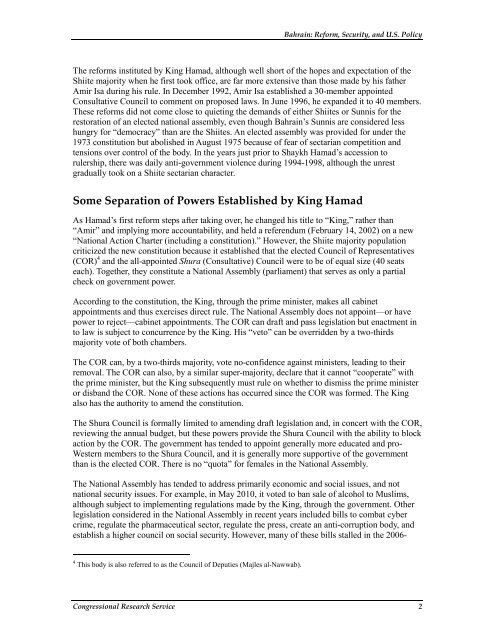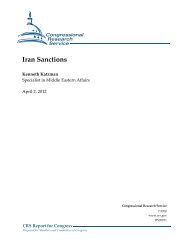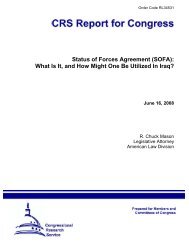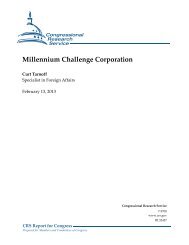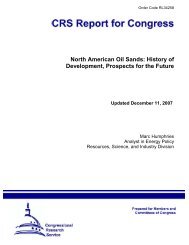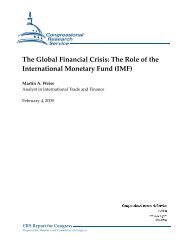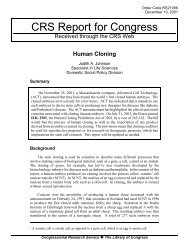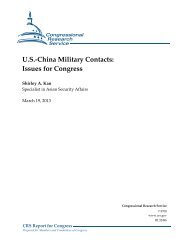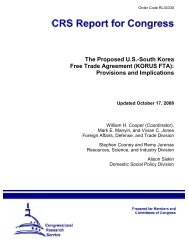Bahrain: Reform, Security, and U.S. Policy - Foreign Press Centers
Bahrain: Reform, Security, and U.S. Policy - Foreign Press Centers
Bahrain: Reform, Security, and U.S. Policy - Foreign Press Centers
You also want an ePaper? Increase the reach of your titles
YUMPU automatically turns print PDFs into web optimized ePapers that Google loves.
<strong>Bahrain</strong>: <strong>Reform</strong>, <strong>Security</strong>, <strong>and</strong> U.S. <strong>Policy</strong><br />
The reforms instituted by King Hamad, although well short of the hopes <strong>and</strong> expectation of the<br />
Shiite majority when he first took office, are far more extensive than those made by his father<br />
Amir Isa during his rule. In December 1992, Amir Isa established a 30-member appointed<br />
Consultative Council to comment on proposed laws. In June 1996, he exp<strong>and</strong>ed it to 40 members.<br />
These reforms did not come close to quieting the dem<strong>and</strong>s of either Shiites or Sunnis for the<br />
restoration of an elected national assembly, even though <strong>Bahrain</strong>’s Sunnis are considered less<br />
hungry for “democracy” than are the Shiites. An elected assembly was provided for under the<br />
1973 constitution but abolished in August 1975 because of fear of sectarian competition <strong>and</strong><br />
tensions over control of the body. In the years just prior to Shaykh Hamad’s accession to<br />
rulership, there was daily anti-government violence during 1994-1998, although the unrest<br />
gradually took on a Shiite sectarian character.<br />
Some Separation of Powers Established by King Hamad<br />
As Hamad’s first reform steps after taking over, he changed his title to “King,” rather than<br />
“Amir” <strong>and</strong> implying more accountability, <strong>and</strong> held a referendum (February 14, 2002) on a new<br />
“National Action Charter (including a constitution).” However, the Shiite majority population<br />
criticized the new constitution because it established that the elected Council of Representatives<br />
(COR) 4 <strong>and</strong> the all-appointed Shura (Consultative) Council were to be of equal size (40 seats<br />
each). Together, they constitute a National Assembly (parliament) that serves as only a partial<br />
check on government power.<br />
According to the constitution, the King, through the prime minister, makes all cabinet<br />
appointments <strong>and</strong> thus exercises direct rule. The National Assembly does not appoint—or have<br />
power to reject—cabinet appointments. The COR can draft <strong>and</strong> pass legislation but enactment in<br />
to law is subject to concurrence by the King. His “veto” can be overridden by a two-thirds<br />
majority vote of both chambers.<br />
The COR can, by a two-thirds majority, vote no-confidence against ministers, leading to their<br />
removal. The COR can also, by a similar super-majority, declare that it cannot “cooperate” with<br />
the prime minister, but the King subsequently must rule on whether to dismiss the prime minister<br />
or disb<strong>and</strong> the COR. None of these actions has occurred since the COR was formed. The King<br />
also has the authority to amend the constitution.<br />
The Shura Council is formally limited to amending draft legislation <strong>and</strong>, in concert with the COR,<br />
reviewing the annual budget, but these powers provide the Shura Council with the ability to block<br />
action by the COR. The government has tended to appoint generally more educated <strong>and</strong> pro-<br />
Western members to the Shura Council, <strong>and</strong> it is generally more supportive of the government<br />
than is the elected COR. There is no “quota” for females in the National Assembly.<br />
The National Assembly has tended to address primarily economic <strong>and</strong> social issues, <strong>and</strong> not<br />
national security issues. For example, in May 2010, it voted to ban sale of alcohol to Muslims,<br />
although subject to implementing regulations made by the King, through the government. Other<br />
legislation considered in the National Assembly in recent years included bills to combat cyber<br />
crime, regulate the pharmaceutical sector, regulate the press, create an anti-corruption body, <strong>and</strong><br />
establish a higher council on social security. However, many of these bills stalled in the 2006-<br />
4 This body is also referred to as the Council of Deputies (Majles al-Nawwab).<br />
Congressional Research Service 2


